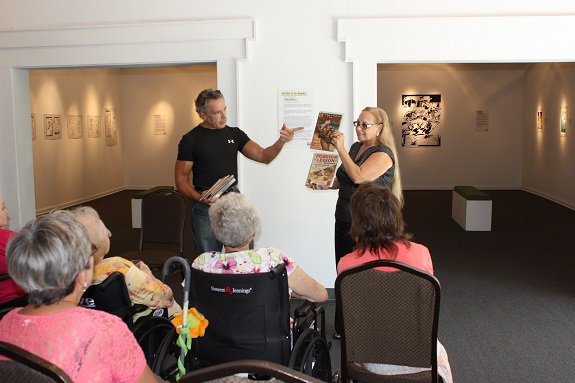- December 15, 2025


Audrey Parente wrote her last book, a biography on pulp fiction giant Theodore Roscoe, 20 years ago. But a renewed interest in the genre has gotten her back to authorship.
BY WAYNE GRANT | STAFF WRITER
When local author Audrey Parente was collecting pulp magazines as a hobby in the 1980s, she had no idea one of the most popular and prolific pulp writers of the 1930s, Theodore Roscoe, was living just two blocks away from her in Ormond Beach. She didn’t know, either, that she would one day write his biography: a book that would come back strong 20 years after its publication, in a current new wave of pulp fiction popularity.
Parente, who recently moved to South Florida to be near her son and grandson, talked about her experience as an author of renewed popularity Monday at the Ormond Memorial Art Museum.
Pulp magazines, such as "Argosy," featured stories of adventure, science fiction, romance and mystery, she explained, printed on cheap paper with glossy covers in the 1920s and 1930s. She got into the genre in 1988, when she wrote a book on the life of Hugh B. Cave, called “Pulp Man Odyssey.”
Parente said about 30,000 copies were printed, and it sold quite well.
Parente mentioned her book about Cave one day to a member of the Friends of the Library, who said, “You should write about Theodore Roscoe; he lives right here in Ormond Beach.”
Parente discovered that Roscoe, a well-known pulp fiction writer, had retired to Ormond Beach from Rhode Island and lived only two blocks away from her in a condo near the intersection of Nova Road and Wilmette Avenue.
She spent several years writing his life story and conducting research.
“I was able to walk to his house and spend a lot of time with him,” she said.
The result was “Pulpmaster: The Theodore Roscoe Story.”
Following the book's 1992 release, its publisher went out of business and the book went out of print after selling only a few copies. Parente then put writing aside to raise her two children and started freelancing for local newspapers.
After hardly thinking of the book for two decades, she received a call from Altus Press last year, asking for permission to reprint. The company told her that collectors were searching online for literature about pulp fiction, and they believed her book on Roscoe would do well.
And they were right. Parente, who has not written a book since 1992, says she has been watching sales rise.
The renewed interest in the genre has even renewed her interest in writing. She's currently working on a book about pulp author Judson Philips.
“Now I’m off to (pulp fiction) conventions and talking about my book,” Parente said. “I have a second chance at book-writing again.”
Jack Kump, a collector of pulp magazines who attended Parente’s talk at the library, said that the current interest in super heroes and video games is part of the reason for the current pulp fiction popularity. Modern-day heroes, such as Superman, Tarzan and even Perry Mason, were developed from characters in the pulp magazines, he said.
The pulp magazine era declined in the 1940s, when World War II brought the price of paper to a premium, and ended in the 1950s, with the advent of television.
Roscoe was a humble, soft-spoken man who had a wry sense of humor, Parente said. He was not recognized in the literary world because of his pulp status.
“He never had fame, but the stories he wrote were superior,” Parente said.
Roscoe actually lived the things he wrote about, she added. He traveled around the world on tramp steamers and stayed in exotic ports with local people. His stories satisfied the need for travel in a day when travel was not so readily available.
“People could read about foreign lands,” Parente said.
Parente’s book on Roscoe is available on Amazon, as is as a collection of her short stories, “Audrey’s Private Haunts.”